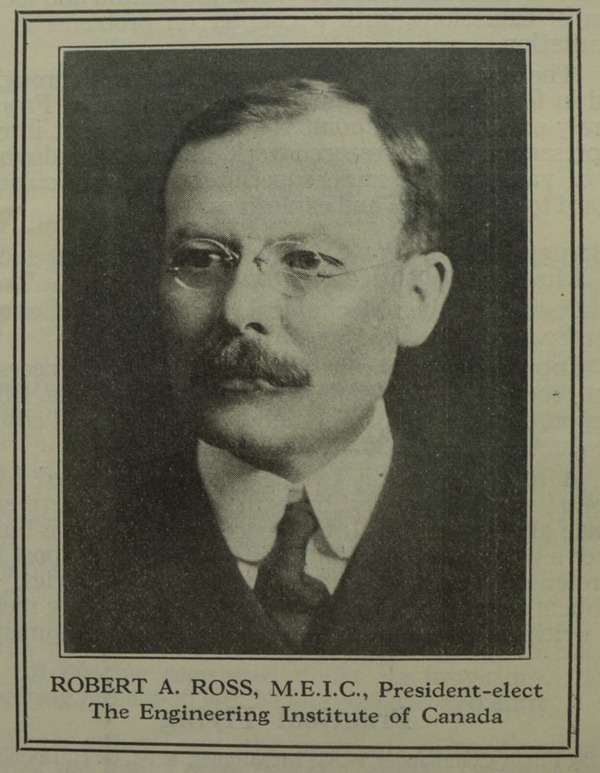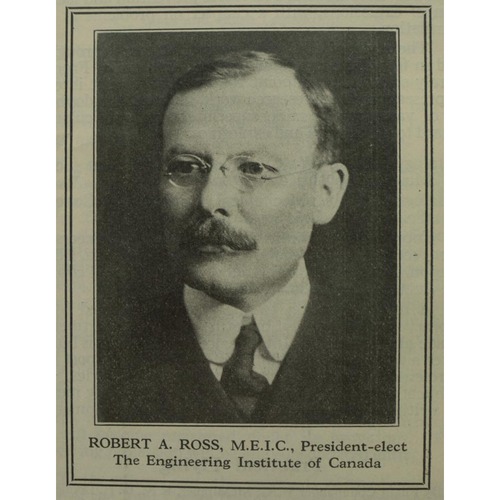
Source: Link
ROSS, ROBERT ALEXANDER, electrical and civil engineer, office holder, and university lecturer; b. 29 Aug. 1865 in Woodstock, Upper Canada, son of Robert Ross and Annie McIntosh; m. 10 Oct. 1894 Margaret Beatrice Halliday in Peterborough, Ont., and they had two daughters; d. 23 Sept. 1936 in Montreal.
Educated at the public and high schools of Woodstock, Ont., Robert Alexander Ross apprenticed there with engine builder Robert Whitelaw before entering the School of Practical Science in Toronto in 1887. He graduated in 1890 with a diploma in mechanical engineering and for the next three years headed the engineering department of the Canadian General Electric Company, first in Sherbrooke, Que., and later in Peterborough. In 1893 he became chief engineer of the Royal Electric Company in Montreal.
The University of Toronto awarded Ross the professional degree of electrical engineer in 1896; that year he started a private consulting firm in Montreal, first acting independently and, after 1901, in partnership with civil engineer Henry Holgate until the First World War. His initial years in private practice took him to the Far East and to Russia, where he reportedly became a close associate of Emperor Nicholas II’s finance minister, Sergei Julievich Witte. On his return to Canada he became involved in hydroelectric development. Two of his early projects in particular illustrate the close ties between hydroelectricity and mineral exploitation. The first, begun in 1904 and completed in 1906, was the Huronian Company Limited’s power plant on the Spanish River in northern Ontario, which provided electricity for the burgeoning mining and smelting industry in Sudbury. The second, undertaken in June 1905 and finished in December 1906, was the construction of a station for the West Kootenay Power and Light Company at Upper Bonnington Falls on the Kootenay River near Nelson, B.C. This project differed from that built for the Huronian firm since it not only served local industry but also contributed to urban electrification. In 1907 the Canadian Society of Civil Engineers awarded Ross and Holgate the Gzowski Medal for technical papers describing these projects. During this time Ross also designed power plants in Copper Cliff (Sudbury), Ont., and Westmount, Que., and for the West India Electric Company in Jamaica [see Benjamin Franklin Pearson*].
In addition to participating in the design of hydroelectric installations Ross provided technical advice that was critical to the formulation of policy on electricity. In 1903 seven Ontario municipalities appointed a commission of inquiry, headed by manufacturer Elias Weber Bingeman Snider*, to investigate the feasibility of a facility at Niagara Falls that they could cooperatively manage. Although Reginald Aubrey Fessenden was the technical adviser to the commission, Ross and Holgate were retained “to investigate and report on the engineering aspects of the whole project.” On the basis of their findings, the commission recommended that the municipalities construct a 60,000-horsepower generating station above Horseshoe Falls. The report, tabled in March 1906, was described by the Globe as being “of incalculable benefit to the southwestern part of Ontario.” Meanwhile, in July 1905 the new government of James Pliny Whitney* had appointed a second commission of inquiry, chaired by a member of the Snider commission, Adam Beck*, which ultimately led to the establishment of the Hydro-Electric Power Commission of Ontario, the largest publicly owned electrical utility in North America. Ross’s involvement with the Niagara hydroelectric project continued for some years thereafter. In 1908 the commission consulted him on specifications for the facility’s transmission lines, and the following year he chaired a conference in Toronto of the commission’s engineers.
After his service with the Snider commission, Ross continued to concentrate on policy development. In 1916 he was among the nine founding members of the federal Honorary Advisory Council for Scientific and Industrial Research, the precursor to the National Research Council. At its first meeting, on 1 Dec. 1916, the council selected him as chairman of a committee to investigate alternative energy resources to remedy shortages resulting from the First World War. The interests of the committee soon shifted to the refining of poor-quality lignite and sub-bituminous coal for use in the prairie provinces. Ross’s report, based on existing research and published in 1918, recommended that the government immediately establish a lignite-refining facility in Saskatchewan. Although he argued in favour of government ownership, he also believed that a board of apolitical “technical and business men,” rather than a government department, should be responsible for managing the plant. Subsequently, between August 1918 and March 1922 he chaired the Lignite Utilization Board of Canada that he had envisaged and, from August 1921 to March 1922, the research council itself. He resigned both positions as well as his membership on the Peat Board, to which he had been appointed in March 1918, to protest an anticipated transfer of the lignite board to the federal Department of Mines, a move he feared would subject the organization to political jealousies and interference.
Despite his contribution to the expanded role of the state Ross was no democrat. Indeed, it was in his involvement in the emerging profession of engineering that his commitment to the autonomy and authority of the expert was most pronounced. A member of the Canadian Society of Civil Engineers since 6 May 1897, he served eight mandates on its council and for three years, from 1914 until 1916, he held the post of vice-president. In 1920 he was elected to the presidency of its successor, the Engineering Institute of Canada. During his tenure, the institute achieved two of its long-term objectives: the introduction of professional-licensing legislation (in six provinces) and the publication of standardized payment schedules. These achievements marked the transformation of engineering in Canada from an open, poorly remunerated trade to an exclusive, self-governing profession. Part of the first generation of university-educated engineers, Ross lectured in engineering economics at McGill University between 1909 and 1911 and contributed to the development of the secret “Ritual of the calling of an engineer,” an esoteric ceremony which inculcated in students a sense of fraternity and an appreciation of the responsibilities that came with professional status.
Ross foresaw a leadership role for his profession in Canada. In his presidential address to the Engineering Institute in 1921 he observed that while the engineer had once been concerned solely with technical subjects, “the signs of the time point to a wider conception of his function, covering a knowledge of human, social and business relations which in the past have not seemed to be within his purview.” Some of his colleagues were dismissive of both scientists and industrialists, but Ross believed in a new role for engineers as the nucleus of a broad, professional, scientific class. He also envisaged a new status for engineers within the population at large. Politicians and the electorate could not be trusted to make competent decisions, and engineers should therefore assume a greater role in public administration, particularly at the municipal level.
Ross had had an opportunity to implement his ideas on municipal governance. When Montreal faced bankruptcy in 1918 the provincial government of Sir Lomer Gouin* amended the city’s charter, transferring most of the powers previously held by the elected mayor and council to the appointed Administrative Commission of the City of Montreal, which consisted of Ernest-Rémi Décary as president and Ross as one of its four other commissioners. Free from democratic oversight, the commission raised taxes and embarked on an ambitious program of administrative modernization, including standardized salary schedules for civic employees. Ross put his experience to good use. In addition to developing an interest in the regulation of slaughterhouses, he was the proponent of resolutions to engage engineers as consultants, establish salaries for technical staff, and authorize actions of the new public works department. When Ross spoke in his presidential address of the engineer as an “emergency man” summoned “to replace the old incompetents who soon return when matters become normal,” he no doubt had his involvement with the commission in mind. Montreal’s return to democratic government in 1921 did not undermine his faith in the capability of experts to correct the mistakes of elected officials.
Questions of policy occupied Ross until late in his career. Well into his sixties, he continued to advise governments, including that of Quebec City, on hydroelectricity rates. In 1922 he had been appointed to the Ontario government’s inquiry into the operations of the Hydro-Electric Power Commission [see Beck]. Chaired by lawyer Walter Dymond Gregory, it investigated cost overruns at the HEPC. Although Gregory’s report reaffirmed the principle of public ownership of the province’s hydroelectric resources, it was critical of the power commission’s financial decisions, cost overruns, and expansion into radial railways. Ross’s influence is perhaps evident in the report’s praise of the commission’s engineers for their competence, and in its comment that external engineers should have been engaged to scrutinize the estimates for the new developments at Queenston and Chippawa. Recognizing the importance of professional autonomy, a tenet Ross had advocated throughout his career, the report expressed the hope that the power commission might still enjoy “liberty of management” in spite of new measures to ensure its accountability to the provincial legislature.
Robert Alexander Ross’s career is representative of the trend towards greater professionalism in Canadian engineering. For his services, the University of Toronto presented him with an honorary doctorate of science in 1922, and the Engineering Institute of Canada awarded him in 1934 the Sir John Kennedy Medal, the profession’s highest Canadian honour. “Dr. Ross early realized,” the Engineering Journal recalled on his death in 1936 at age 71, “that for an engineer worthy of the name, competence as a designer, knowledge of scientific principles and familiarity with technical detail must be joined with administrative capacity and the ability to deal with men and affairs.” Ross’s career epitomized his conception of the engineer as a proficient technical expert with a claim to authority in matters of policy.
Robert Alexander Ross, in collaboration with Henry Holgate, wrote “The Huronian Company’s power development” and “Power development on the Kootenay River for the West Kootenay Power & Light Company, Limited,” which appeared in Canadian Soc. of Civil Engineers, Trans. (Montreal), 21 (1907): 123–38, 149–57. He is also the author of The briquetting of lignites, published in 1918 as vol.1 of Can., Honorary Advisory Council for Scientific and Industrial Research, Report (29v., Ottawa, 1918–25) and “Retiring president’s address,” Engineering Instit. of Can., Journal (Montreal), 4 (1921): 198–202.
AO, RG 18-83; RG 80-5-0-218, no.10099. VM-SA, VM18. Globe, 4 April 1906. Canadian men and women of the time (Morgan; 1912). McGill Univ., Annual calendar (Montreal), 1909–11. J. R. Millard, The master spirit of the age: Canadian engineers and the politics of professionalism, 1887–1922 (Toronto, 1988). Jeremy Mouat, The business of power: hydro-electricity in southeastern British Columbia, 1897–1997 (Victoria, 1997). “Obituaries: Robert Alexander Ross, m.e.i.c.,” Engineering Journal (Montreal), 19 (1936): 463–64. Mel Thistle, The inner ring: the early history of the National Research Council of Canada (Toronto, 1966).
Cite This Article
Forrest D. Pass, “ROSS, ROBERT ALEXANDER,” in Dictionary of Canadian Biography, vol. 16, University of Toronto/Université Laval, 2003–, accessed December 28, 2025, https://www.biographi.ca/en/bio/ross_robert_alexander_16E.html.
The citation above shows the format for footnotes and endnotes according to the Chicago manual of style (16th edition). Information to be used in other citation formats:
| Permalink: | https://www.biographi.ca/en/bio/ross_robert_alexander_16E.html |
| Author of Article: | Forrest D. Pass |
| Title of Article: | ROSS, ROBERT ALEXANDER |
| Publication Name: | Dictionary of Canadian Biography, vol. 16 |
| Publisher: | University of Toronto/Université Laval |
| Year of publication: | 2017 |
| Year of revision: | 2017 |
| Access Date: | December 28, 2025 |



